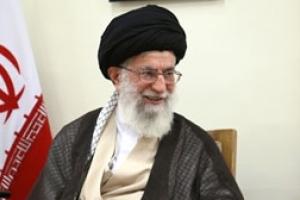2015/06/29 – Ayatollah Seyyed Ali Khamenei, the Leader of the Islamic Revolution, in a meeting with the judiciary chief and officials, while honoring Ayatollah Mohammad Hosseini Beheshti and Ayatollah Ali Qoddousi, both martyred senior judiciary authorities, described the “independence and non-impressionability” of the judiciary as very important.
He said: “All factors disrupting the independence of the judiciary, including threats, subornation, ceremoniousness and public opinion’s pressure, should be dealt with, and correct judicial behavior and methods should be relied on.”
Ayatollah Khamenei referred to “authority” as a factor of independence in the judiciary apparatus, saying: “The judiciary’s seeking authority is not the conventional type of authority sought in politics and [sought] by [political] factions, but it means determination and insistence on the truth.”
“Abidance by the law and full health” in the judiciary apparatus were two other factors the Leader described as effective and important for the independence of the judiciary.
Ayatollah Khamenei said: “With regard to the health of the judiciary, good work has been done and this should continue with seriousness because any corruption within the judiciary apparatus will clear the way for bigger corruption in the society.”
Ayatollah Khamenei said “crime prevention” is another sensitive and important issue of the judiciary.
“Of course, other organs should also be active in this regard, but there must be organized efforts to that effect, because otherwise, crime will constantly increase and it will not be possible to manage it (crime) on a large scale,” said the Leader.
Ayatollah Khamenei expressed regret over the growing number of prisoners, saying: “This issue is imposing costs from different financial, family, moral and social aspects and a remedy must be found by concentrating on different solutions.”
To that effect, the Leader said promotion of the culture of peace and reconciliation in the society, pinpointing maladies and boosting dispute settlement councils are effective in reducing the number of prisoners, adding: “In order to deal with the negative consequences of the rising number of prisoners [held in jail] on financial and drug [trafficking] charges, new suggestions and solutions must be sought.”
The Supreme Leader stressed the need for efforts to facilitate marriage for youth, and touched on some problems brought up at family courts, including “consensual divorce”, saying: “The esteemed judges must minimize such issues with the help of senior family members.”
“Plan-orientedness”, “revision of and making amendment to the laws” and “staff recruitment” were three important points and pieces of advice which the Leader expounded on in his speech.
Emphasizing the necessity of “plan-orientedness” in the judiciary apparatus, Ayatollah Khamenei said: “Reliance on a clear and systematized plan would help move ahead accurately on the path to a future perspective and keep one from getting entangled in everyday struggles.”
With regard to the second point, i.e. revision of the laws, the Leader said: “Law paves the way for the country’s progress and if some laws are flawed or contradict each other they need to be amended, but I, by no means, accept dodging the law.”
As the last recommendation, Ayatollah Khamenei described “staff recruitment” as very important, saying: “There is talented and upright staff in the judiciary who you should nurture for big plans.”
At the beginning of his speech, Ayatollah Khamenei extended congratulations on the Judiciary Week and commemorated martyrs Beheshti and Qoddousi.
Referring to the exceptional role and personality of Ayatollah Beheshti during the years of his revolutionary struggles and also his contribution to the administration of the country in the course of the revolution, the Leader said: “Ayatollah Behehsti was a rare figure of the time, and was viewed as a charismatic and revolutionary personality, a [qualified] manager and an insightful and revolutionary person whose life was really beneficial to and effective for the revolution and the country, and his martyrdom brought about unity and solidarity in the society and strengthened the revolution.”
Ayatollah Khamenei also described Ayatollah Qoddousi, the first prosecutor of revolutionary courts, as a person with a delicate spirit and at the same time courageous and unimpressionable.
The Leader also lauded the judiciary chief for his dynamism, resolve and studious management in fulfilling responsibilities [assigned to him]. With regard to the importance of the judiciary apparatus, Ayatollah Khamenei said: “The judiciary is one of the three pillars of the country and is in charge of executing a major part of Islamic instructions. Therefore, expectations that this branch of government make endeavors and efforts and endure hardships are reasonable.”
Prior to the Leader’s speech, Judiciary Chief Ayatollah Sadeq Amoli Larijani commemorated the martyrs of the June 28, 1981 terror bombing, particularly Ayatollah Beheshti, and presented a report on the judiciary’s measures and plans.
Ayatollah Larijani referred to the Leader’s demands on the judiciary, saying the judiciary’s six priorities are working out a specific and clear mechanism to make policies and follow up on their execution, monitoring the performance of the judiciary, preventing any delay in judiciary affairs, staff recruitment and nurturing successors, crime prevention and interaction with the other two branches of government (executive and legislative). He said: “The judiciary’s policies have been adopted based on the Leader’s guidelines, the [20-year national] Outlook Plan and the country’s Five-Year [Economic Development] Plan, and have been drawn up under a five-year judiciary plan.”
Saying that the performance of judges and the judiciary staff are strictly supervised, Ayatollah Larijani said: “The entire judiciary apparatus has been mobilized to boost administrative health.”
Among other points highlighted by Ayatollah Larijani was the fact that the time needed for judiciary procedures has been shortened as well as a higher productivity rate in the judiciary structure and crime prevention efforts.
At the end of the meeting, Ayatollah Khamenei led evening mass prayers.


















